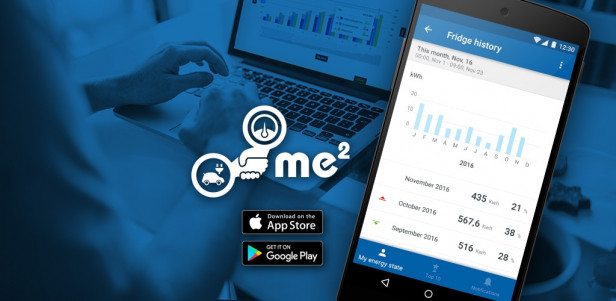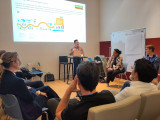The project me² represents a new market place for urban actors in which a local community of electric vehicle (EV) users and local smart meter (SM) owners are brought together through means of a local urban online community.
The combination of these technologies in a community allows to integrate mobility with electricity, to balance the grid, to reduce electricity costs, and to enable a feeling of local belonging. me2 enables urban demand-side management, i.e. aims to modify consumer demand for energy such as using less energy during peak hours in an urban community. The project applies the technical and academic state of the art regarding smart grids, electric mobility, business models and policy incentives to the development of an innovative service concept, which is validated and optimized in two practical pilots and demonstrations in urban communities in Amsterdam and Lisbon.
me2

What is the goal of the project?
Peak hours in electricity consumption are getting larger, with otherwise environmentally friendly electric vehicles adding to this problem by charging during peak hours. To alleviate grid congestion, demand side management can be applied to appeal to people to consume electricity outside of peak hours. We address the problem by raising individual awareness of this problem and their current usage, as well as nudging them with engaging incentives through a webplatform.
What is the result of the project?
A tested, validated and operational Smart City Aggregator platform
Pilots in two different settings, i.e. in a city with high degree of EV adoption (Amsterdam) and in a city with a lower degree of EV adoption (Lisbon), using an open-community (in Amsterdam) and closed-community (in Lisbon)
Increased understanding and integration of e-mobility and electricity behavior, developing mechanisms to influence these behaviors using gamification elements based on smart algorithms, on an individual and community level, building on triggers like social comparison, measured self and social recognition in two different cultural settings
More balanced local grids, defined as a 10% smoothened load curve through for instance gamified demand shift controlled by balancing algorithms
Lowered average energy costs for consumers, defined as 10% lower household energy costs, for instance as a result of enabling smarter, more economical energy usage patterns
A policy recommendation set for local and national agencies
A viable business model, including a positive business case and an enticing value proposition
A functional and tested energy monitoring platform for consumers, with a B2B interface for energy retailers, to e.g. enable flexibility in energy consumption and production. The platform will be tested in Lisbon and the Netherlands (in and around Amsterdam) in two communities of 50 people, whose electricity consumption is measured. The final result, available spring 2018, will be a tool that can reach energy aware consumers in order to alleviate local grid congestion during peak hours (e.g. between 5pm and 8pm).
Who initiated the project and which organizations are involved?
me2 ("me square") is a European research project, with Dutch, Portuguese and Austrian partners, funded by JPI Urban Europe. We test how an integrated platform with data from household smart meters, EV charging and PV production can help users take action to alleviate grid congestion during peak hours. Key engagement tool are direct feedback, incentives, gamification and an online community. The platform will be coupled with a market place and a B2B interface to act as a potential aggregator.
The project started in June 2016 and will run until May 2018. It is funded with the ENSCC call of JPI Urban Europe and is coordinated by Amsterdam University of Applied Sciences (HvA). Other partners are Catolica University of Lisbon (Portugal), MediaPrimer (Portugal), VPS (Portugal), Lisboa E-Nova (Portugal) and Moomoar Energies (Austria).




